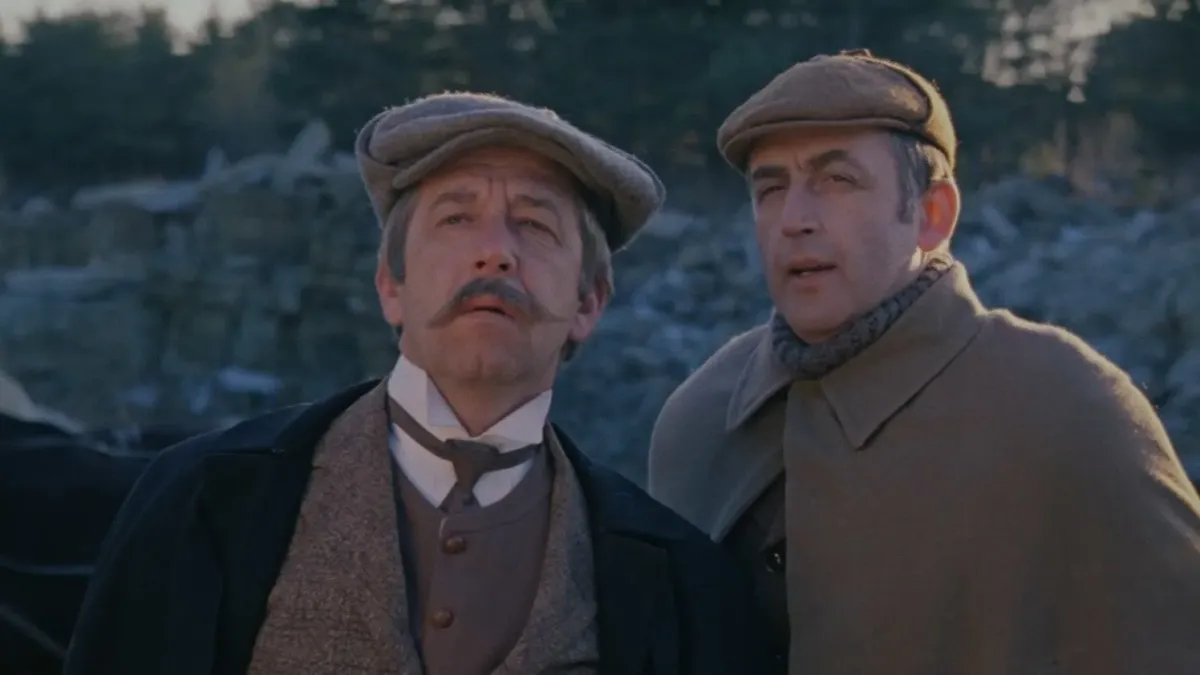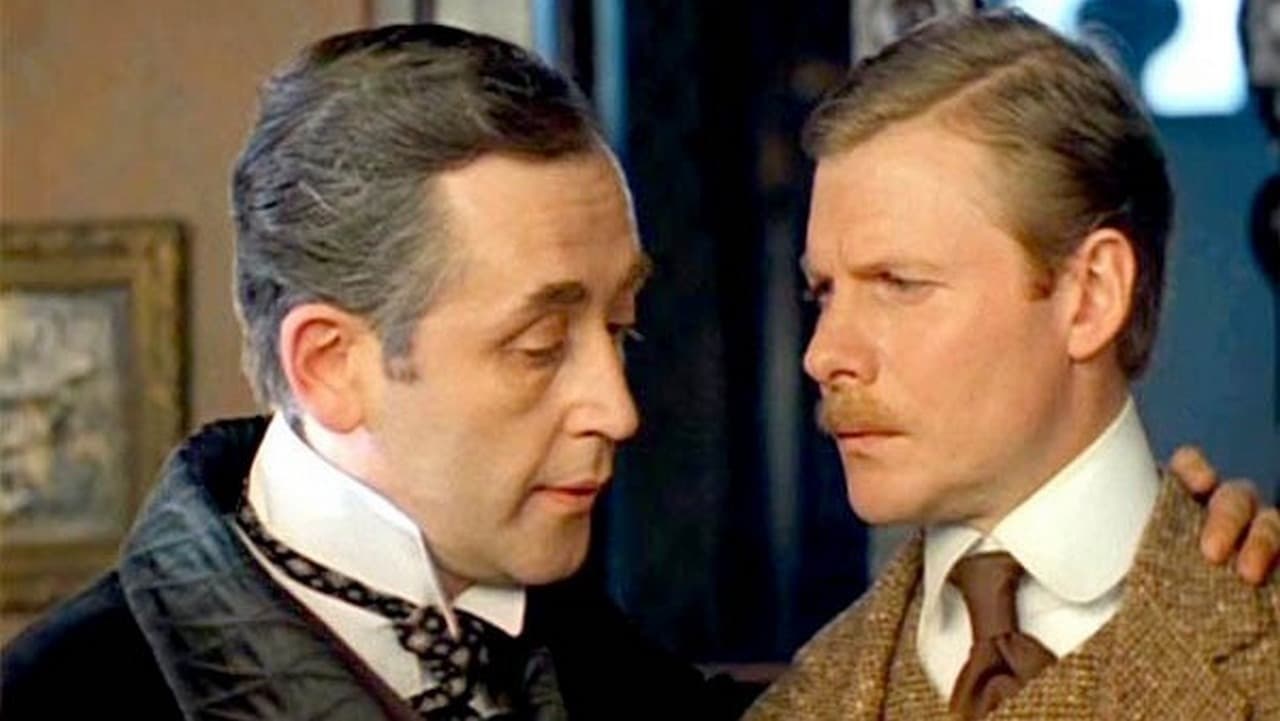The many joys of the Soviet Sherlock Holmes
It's one of the best TV shows there is.

(For the next few weeks, the Wednesday freelance newsletter is moving to Fridays, as I continue to recuperate. Each week, I’m publishing a new pop culture essay from a freelancer. Remember: Your subscription fee helps me pay these freelancers for their efforts! This week: Ciara Moloney on the wonders of the Soviet adaptation of Sherlock Holmes.)
Contemporary television feels like an endless tide of hot new thing after hotter newer thing. I find the faux-urgency of it genuinely stressful. Now, I love television, but I hate obligations, so I find myself retreating into the medium’s past, to shows which, pending an ill-advised reboot or two, don’t feel like they come with a deadline. And very little comes with less of a deadline than a Soviet adaptation of Sherlock Holmes from the 1970s and ‘80s.
The Adventures of Sherlock Holmes and Dr. Watson is usually called a series of TV movies, but I’m not sure why: each of the five “TV movies” aired separated into either two or three episodes, making them pretty normal TV seasons by European standards. Despite Vasily Livanov being given an MBE for his portrayal of Holmes, the show isn’t talked about or remembered much in the English-speaking world, at least outside of Holmes fanatics. It will appear and disappear onto YouTube every so often, and you can stream it if you pay to join Soviet Movies Online, a specialist streaming service for Soviet cinema. But it’s not going to show up on Netflix or generate a hundred articles announcing it on entertainment news websites if it did. But as it turns out, it’s one of the best TV shows there is.
Despite being made in the latter-day USSR, Sherlock Holmes and Dr. Watson is obviously, palpably set in nineteenth-century London. Where actual British-made shows around the same time often had a slightly cramped quality — BBC budgets of the era generally having a make-do-and-mend, film-intergalactic-adventures-all-in-this-quarry vibe — Sherlock Holmes and Dr. Watson feels expansive and full. It is an extremely faithful adaptation of Arthur Conan Doyle’s stories, with particularly close attention to period detail. Yet it never feels like a rote recitation of familiar tales. The whole show is alight with joyful energy, combining the traditional charms of detective shows and sitcoms with a level of ambition and serialization more typically associated with 21st century TV. It doesn’t just feel like an especially good Sherlock Holmes show; it feels like something fresh and new and entirely its own.

A huge part of what gives it this fresh feeling is Dr. Watson, played beautifully by Vitaly Solomin. Never just a sounding board or sidekick for Holmes, Watson is an equal co-protagonist and frequently the effective lead. It’s not a coincidence that The Adventures of Sherlock Holmes and Dr. Watson has Watson’s name in the title. Often, Sherlock Holmes adaptations are so in thrall to Holmes’s genius that it becomes the center around which everything else rotates. I am thinking in particular of BBC’s Sherlock, starring Benedict Cumberbatch, a show so in love with Sherlock Holmes that it would bend space-time to make sure he always came out looking clever. But the Soviet adaptation’s heart belongs to Watson. Watson is what gives the show such warmth, humor, and depth of feeling. This is, paradoxically, also what elevates Livanov’s portrayal of Holmes to such heights. Central to his performance is that he has to play Holmes not just as a great detective, but so that the audience can instinctively understand why Watson loves him so much.
In the first episode, Watson moves in with Holmes in the flat on Baker Street. The show takes its time setting up a pretty classic odd-couple dynamic. Watson is neat and orderly and polite — a former military doctor — and Holmes does dangerous science experiments and plays his violin (badly) at unsociable hours. Where most former roommates have gotten sick of Holmes’s shit real quick, Watson is intrigued. Holmes has these incredible powers of deduction yet doesn’t know the Earth goes around the Sun. (“Suppose the Earth does rotate around the Sun!” Holmes says, considering the possibility. Watson interrupts, aghast, “What do you mean, suppose?!”) Watson’s attempts to figure out what Holmes’s deal is — this strange man who sneaks around late at night, with his seemingly infinite supply of disguises — lead him to suspect that Holmes is a master thief.
This is all extremely funny and feels more like a particularly good sitcom pilot than a Sherlock Holmes story. Livanov’s Holmes is a mischievous prankster — he has the disguises for professional purposes, sure, but there’s more than a small part of him that finds people not recognizing him hilarious — and finds Watson thinking he’s a criminal very amusing. When he reveals the truth, Watson blushes, adorably embarrassed. Solomin’s Watson wears his every emotion on his face, like a man who’s never learned to hide his feelings, never felt like he was supposed to. He is totally unhardened, just open, so full of tender feeling that it has to come out in a soft look in his eyes or the quirk of a smile beneath his mustache. As their relationship deepens, sometimes Watson looks at Holmes-like his face will crack open with love.
The show never explicitly goes there, because it’s a Soviet Sherlock Holmes adaptation from the 1980s, but it has a pleasantly queer sensibility, full to bursting with meaningful looks and casual intimacy. Holmes holding a handkerchief to the bump on Watson’s head while he snuggles into his side. The two of them walking down the street arm in arm. How an oft-used shot of the pair in a train carriage forgoes each sitting politely on their side for Watson throwing his legs over Holmes’s seat while he reads the paper and Holmes shaves. When he’s sent on a solo mission, Watson draws little doodles of Holmes in his notebook, like a pre-teen.
It’s easy for a contemporary audience to dismiss as queerbaiting, a recurring controversy with Sherlock Holmes adaptations that reached its nadir with the Benedict Cumberbatch one. But, for me at least, the queer subtext to Adventures of Sherlock Holmes and Dr. Watson never feels as calculated and cynical as all that. Partly, of course, it doesn’t come off as queerbaiting because baiting the queers was a much less marketable strategy in 1979, and in the USSR at that. But mostly it’s an utter sincerity that shines through. I end up filing it alongside original series Kirk and Spock in the “a touching depiction of two men in love made in a context where you couldn’t just show them kiss on the mouth” folder.

By the end of the first feature-length episode, the two of them get around to solving mysteries together. Watson is instantly devoted to Holmes, even if he’s not much of a detective himself. (Frequently, Holmes will ask for Watson’s opinion on a case just so he can explain why everything Watson said is wrong.) Detective stories seem uniquely well-suited to the medium of television. The push and pull of clues, the many reveals and reversals are ideal for the rhythms of broadcast, just as easily making an episode satisfying in and of itself or satisfying as a section of a bigger story. Sherlock Holmes and Dr. Watson offers both types of episodes. Where season one will adapt a short story or two per episode, later seasons adapt whole novels or adapt stories in a way that draws them into relation with one another. This could be in plot terms, like when the show features Moriarty as season two’s overarching big bad. Or it could be in thematic terms: “A Scandal in Bohemia,” the story where Holmes is entranced by Irene Adler, is framed as a flashback in The Sign of Four, where Watson meets his future wife, Mary, the only person he looks at with the same lovestruck awe as he does Holmes.
The show keeps its sense of humor from its early days — Holmes and Watson burgle a house and Watson screws it up in huge, hilarious fashion, including stepping in paint and leaving bright white footprints after himself — but it never shies away from more dramatic territory, and not just for the lads’ clients. The show’s second season in part adapts “The Final Problem,” in which Holmes appears to die, and "The Adventure of the Empty House,” in which he miraculously returns. The three episodes are an incredible run, starting with a standalone adventure that teases what's to come by introducing Moriarty. It’s the kind of TV that reminds me how much I love TV. Each episode is thrilling, never feeling bloated even with hour-plus runtimes, more likely leaving you hungry for more. I couldn’t wait to watch the next one. Part of that giddy excitement is wanting to see what happens, even if I already knew the broad strokes. But a lot of it is just wanting to spend more time in this world with these characters.
That I love them both so much is part of what makes Holmes’s death so devastating. Watson is called away for a medical emergency before Moriarty shows up to challenge Holmes to a physical fight that ends with them both going over the Reichenbach Falls. Watson realizes there was no medical emergency and that it was a trick to get Holmes alone, but too late. He doesn’t get a chance to say goodbye. The last thing Holmes does before the fight is write a note to Watson. Solomin is extraordinary in the scene where Watson realizes Holmes is dead and reads his letter: a man who always wears his feelings on the outside plunged into the most horrific emotional pain possible.
The show keeps Holmes dead for what feels like a long time. Even though he comes back in the very next episode, you feel the passage of time when the episodes are feature-length or close to it. You get the chance to miss and mourn Holmes. Solomin sells that grief so well as Watson. In one scene, he enters Holmes’s room — for the first time alone — and plays Holmes’s violin. You can feel the ghost in the room with him. And this makes Holmes’s return all the more triumphant. Because we got the depth of Watson’s grief, we get the heights of his relief and joy.
The show ends at the dawn of the 20th century. Watson has gotten married, Holmes has retired to a farm in Sussex, and Mrs. Hudson made the buyer of the house on Baker Street promise to turn it into a museum in Holmes’s honor. “Why only mine?” Holmes asks when Watson tells him, “You are trying to keep yourself out? No way. You’re an old smelly relic just like me, Watson.” Watson’s smile at that is a thing of beauty.
They do one last job, of course. But these are 19th century men, and they seem ill-equipped for the new world dawning around them: not just because Holmes can’t get his head around how to use a telephone, but because a new breed of criminality — where men wage wars that kill millions just for profits — make the thieves and murderers they used to catch seem innocent.
Episodes is published three times per week and edited by Emily VanDerWerff. Mondays feature her thoughts on assorted topics. Wednesdays offer pop culture thoughts from freelance writers. Fridays are TV recaps written by Emily. The Wednesday and Friday editions are only available to subscribers. Suggest topics for future installments via email or on Twitter. Read more of Emily's work at Vox.



